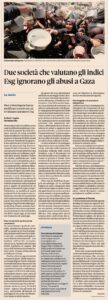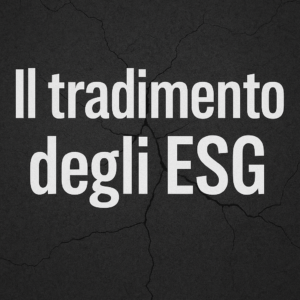
(The Betrayal of ESG – ep.2)
The international investigation conducted by Follow The Money, Il Sole 24 Ore, and Irpi Media revealed what many feared but few dared to denounce: ESG indices, originally created to guide responsible investments, have been emptied of meaning, bent to the logic of power and geopolitics, reduced to mere window-dressing labels.

The accusations made against MSCI and Morningstar Sustainalytics are clear: the two main ethical rating agencies allegedly changed their evaluation criteria on human rights in the Occupied Palestinian Territories, removing penalties for companies involved in documented violations. This is the case with Caterpillar, long criticized for supplying bulldozers used in demolitions and military operations, and Motorola, which provides surveillance systems for Israeli settlements.
Today, these same companies, despite serious accusations, find themselves awarded higher ESG scores. How did this happen? How can companies directly linked to human rights violations be classified as “ethically sustainable”? What ethics are we really defending?
Morningstar admitted to yielding to pressure from pro-Israeli groups like JLens, altering its assessments to remove inconvenient references. MSCI responded with weak explanations, unable to justify the omission of ongoing controversies. These are not errors: these are choices. Conscious choices that have turned tools meant to defend rights into shields protecting the powerful.
And so, in the end, the world can only be the projection of our inner condition of being dis-human. Unless truly human beings rise up—silently, but with strength.
The Shipwreck of Values
Thus collapses the illusion of ethical finance being immune to geopolitical interests. Trust—the pillar on which every ESG assessment rests—has been shattered. “If ESG parameters can be manipulated by external pressure, the entire framework collapses,” noted Professor Patrizio Monfardini. So: how can we still trust human rights data? How can we tell who truly acts responsibly from those who simply bought a badge of respectability?

We are facing a crisis far beyond ethical finance. It is a moral, cultural, systemic crisis. The ESG model, already showing limits in its fragmentation and reduction of complexity to mere numbers and checklists, now reveals itself as fertile ground for opportunism and complicity. Not just ineffective: complicit. Who is to blame? The rating agencies? The companies pushing for a green stamp? Or all of us, who accepted the idea that “checking boxes” was enough to make an unsustainable system sustainable?
From Greenwashing to Ethicwashing
What we are witnessing is a new level in the ethical drift of finance: from greenwashing to ethicwashing. A system that not only simulates responsibility but neutralizes it, empties it, bends it to strategic interests. A system where sustainability is reduced to a slogan, and governance is governance of profit, not of the common good.
In all this, the companies most involved—from military tech giants to suppliers of surveillance and occupation tools—reveal what they’ve always been: not just beneficiaries of a corrupt system, but active gears, protagonists in a global chain of complicity.
How can we keep fooling ourselves into thinking that “tweaking a few parameters” or “introducing new guidelines” is enough to change course? Isn’t the very model already irreparably compromised? Isn’t it time to stop chasing new “sustainable labels” and start asking what kind of economy, society, and politics we want to build? And above all, what kind of humanity we want to be!
An Inevitable Crossroads
Do we really need another “green,” “ethical,” “responsible,” “sustainable” label? We need a radical break from a logic that separates the economic from the human, that measures ethics with algorithms, that reduces complexity to graphs, scores, ratings.
The current model is not just vulnerable: it is functional to the preservation of the status quo. It is the mask of a system that seeks to absolve itself while feeding the very crises it pretends to fight: environmental, social, cultural.
At this point, the question is not whether the ESG paradigm is salvageable. The question is: do we want to keep defending a system that has already proven to betray its own principles? Or are we ready to abandon it, to imagine and build a new way of inhabiting the economy, society, the Earth? Are we ready to be human?

The time has come for a definitive, individual and collective stance: either implode for good, unconsciously fascinated by the baseless promises of a Linear Economy that offered infinite growth based on an extractive and indiscriminate use of resources, and consciously anesthetized by the inconclusive paradigms of a Circular Economy, which can only invite us to reduce, recover, recycle, repurpose, and at most regenerate.
Or we must re-act, finding the strength and courage to enter a new economic era, where each individual understands they can (and must!) contribute—acting within their own sphere of influence—by embodying the principles of a Spherical Economy, which aims first and foremost to re-humanize itself, and to re-vitalize, re-animate, and ultimately re-spiritualize itself, thus bringing spiritual reflection back to the center of our choices and restoring to our souls the dignity of their greatness, of their essence.
The Final Solution
But this is not about adding another slogan to the list. This is an act of courage, an irreversible stand.

Because the truth is clear: what we call “ethical finance” today has not lost its soul—it never had one! And it never had one because those who created these models deliberately avoided confronting their own inner questions about the deeper meaning of their existence, just as they avoided any reflection on the origin of their soul, rejecting the relevance of the search for a connection with the Spirit.
Without soul, and without Spirit, there is no future that can be called “human.” Because *“We are not human beings having a spiritual experience. We are spiritual beings having a human experience.”*







